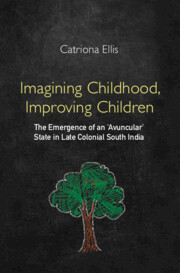 Imagining Childhood, Improving Children
Imagining Childhood, Improving Children Book contents
- Frontmatter
- Dedication
- Contents
- Acknowledgements
- List of Abbreviations
- Introduction
- 1 The Child at School: Compulsory Education in the Madras Presidency
- 2 Educating the Child: The Introduction of Compulsory Education in Madras City
- 3 Imagining the Child as Learner: Progressive Pedagogy in the Madras Presidency
- 4 Producing the Healthy Schoolchild
- 5 Saving the Child: The Madras Children Act, 1920, and the Beginnings of a Juvenile Justice System
- 6 Protecting the Poor Child: The Practical Expansion of Juvenile Justice
- 7 Defining Childhood: Sexual Parameters of Childhood
- 8 Remembering Childhoods: Childhood Memories in Autobiographies
- Conclusion: Children, Childhood and the Growth of the Avuncular State in South India
- Notes
- Bibliography
- Index
3 - Imagining the Child as Learner: Progressive Pedagogy in the Madras Presidency
Published online by Cambridge University Press: 19 April 2023
- Frontmatter
- Dedication
- Contents
- Acknowledgements
- List of Abbreviations
- Introduction
- 1 The Child at School: Compulsory Education in the Madras Presidency
- 2 Educating the Child: The Introduction of Compulsory Education in Madras City
- 3 Imagining the Child as Learner: Progressive Pedagogy in the Madras Presidency
- 4 Producing the Healthy Schoolchild
- 5 Saving the Child: The Madras Children Act, 1920, and the Beginnings of a Juvenile Justice System
- 6 Protecting the Poor Child: The Practical Expansion of Juvenile Justice
- 7 Defining Childhood: Sexual Parameters of Childhood
- 8 Remembering Childhoods: Childhood Memories in Autobiographies
- Conclusion: Children, Childhood and the Growth of the Avuncular State in South India
- Notes
- Bibliography
- Index
Summary
Pedagogues and teachers working at a local level made significant contributions to the discursive construction of childhood in south India. Their work ran parallel to the expansion of elementary education within the Madras Presidency as a result of state action, as considered in earlier chapters. The introduction of compulsory education had encouraged the institutionalisation of childhood and meant that, in popular and state discourse, children were now assumed to be in school and were perceived primarily as learners. Beginning from this assumption, south Indian educators were interested in what happened within the classroom and the detail of how knowledge was transmitted to children. The writings of these pedagogues reflected the new global interest in ‘progressive education’, which emphasised the central role of the child as a recipient of elementary education and focused on pedagogy and educational methods rather than the content of the curriculum or the structures of the educational administration. The tension between these universalising ideas and the local context is the central concern of this chapter.
The writings of Indian pedagogues in the Educational India, an English-language pedagogical journal printed in south India during the 1930s, reveal contemporary theory about what was to happen within the classroom. These pedagogues sought to distance themselves from traditional education and emphasised learning through activity, an approach based on a very different understanding of the innate characteristics of children and their capabilities as learners which sought to put the child at the centre of the educational process. Pedagogues claimed a role for themselves as scientific experts and constructed pedagogy as a science. Significantly, this established the children as the objects of scientific endeavour, knowable through the methodologies of modern pedagogy. Moreover, as experts, these pedagogues claimed the authority to negotiate the relationship between new innovative Western pedagogies and their application in the Indian context. This was part of a longer trajectory where pedagogical strategies were formulated and reformulated in different local contexts, an example being the introduction of the Madras Method of monitorial teaching into early Victorian Britain. The period after the First World War saw a particular interest in these exchanges, based on a new scientific emphasis that all children matured along a broadly universal developmental sequence, regardless of background, race or community. This both challenged prevailing beliefs in racial hierarchy and reinforced a particular construction of healthy, male, educated children as normative, delegitimising childhoods that failed to reach this standard.
- Type
- Chapter
- Information
- Imagining Childhood, Improving ChildrenThe Emergence of an ‘Avuncular’ State in Late Colonial South India, pp. 72 - 97Publisher: Cambridge University PressPrint publication year: 2023


